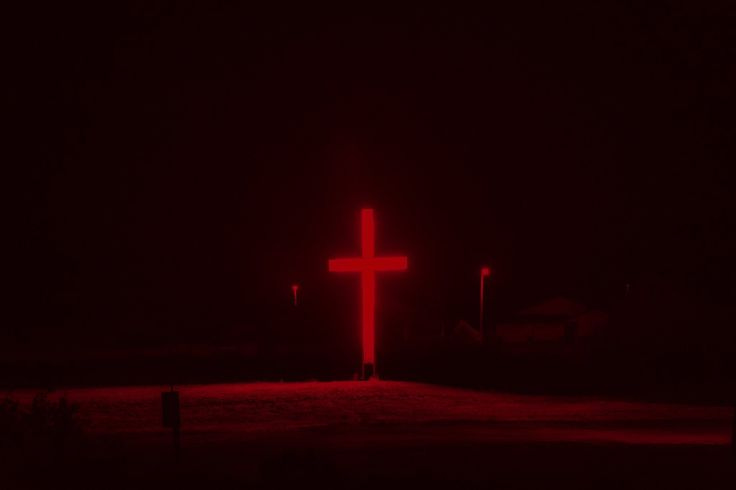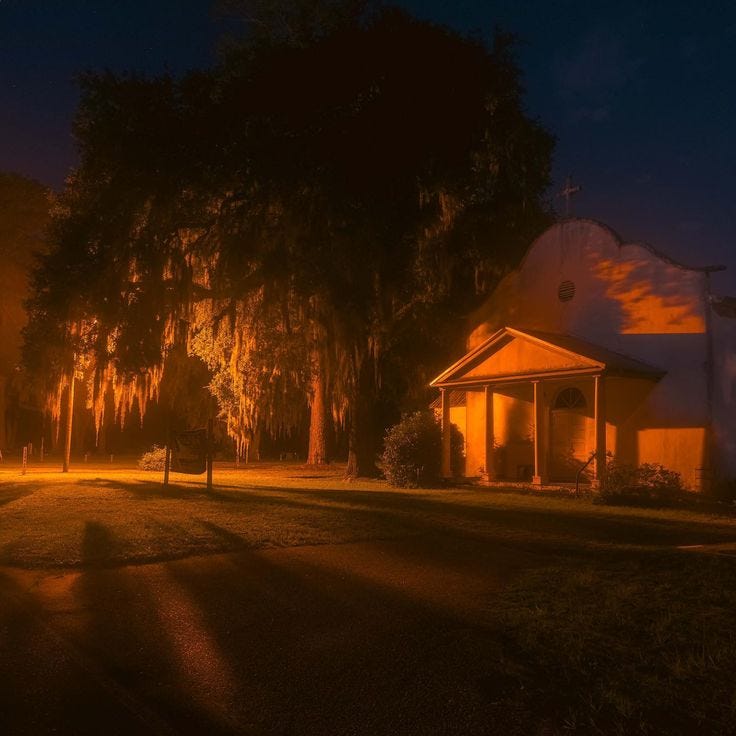Write & Lift is an ethos of personal and spiritual development through conscious physical exertion and practice of the writing craft. Through this effort to strengthen our bodies and minds, we become anti-fragile and self-respecting sovereign individuals. Through this effort, we may stand against untruth and evil and create a new culture of vitality, strength, and virtue.
American Archetypes: The Deep South
The Deep South holds time like a fraying quilt stretched across the earth. Its patterns are stitched with blood, sweat, and ghosts. It’s a place where the past lingers not as a memory but as a shadow, in the cypress swamps and decaying main streets and in the kudzu-clad plantation ruins. There is beauty here that is tender and unrelenting, soft and weathered.
The Southerner breathe their history. They have a peculiar strength born of loss, resilience, and suffering transmuted into a rooted pride. They are entwined with their past but aren’t defined by it. The Southerner knows how they’re caricatured and guards their history out of necessary caution, like the groves of ancient oaks draped with Spanish moss whose branches twist and turn to shade the light from the sky above them.
They share a simple politeness, gentle and slow, magnified by either a slow drawl or black Creole English, an accent that carries an air of gravity and importance, a living relic of a long-forgotten era.
“God don’t like ugly.”
“Don’t let the devil ride, ‘cause he’ll wanna drive.”
“Every goodbye ain’t gone.”
People do not live lightly here. They live on the edge of some great and terrible revelation. They laugh often and eat well. They believe in ghosts because they are surrounded by them, in the land, the air, and themselves. They sing of heaven while they toil in hellish heat. Their faith is fierce and god-fearing, and they carry sin-like crosses, which are heavy and unhidden.
Old Country Blues
Ten years ago, when I first traveled to the Deep South, I’d been conditioned as a young man to believe that its people had, out of some aberrant pride, willingly exiled themself to poverty and resentment. I assumed they bore the monolithic weight of their history to the point of inaction. A broad and scattered Compson family from William Faulkner’s Sound and Fury, broken by failed expectations and neglect. I imagined a black underclass casting side-eye glances and keeping tabs on the great-grandsons and daughters of former aristocratic glory. I imagined resentful whites waiving a middle finger at those who they saw as compromising their lost way of life.
I didn’t imagine these things out of total ignorance. It’s what I was taught; the shadow of slavery and reconstruction omnipresent—a decaying house of old rusted nails, splintered studs, and a leaky roof. It wasn’t that they weren’t given the chance to catch up with the rest of us; it was that they didn’t want to. I was wong.
You can’t talk about the Deep South without talking about race or, in this case, the misconception of what it represents among Southerners. The Confederacy is America’s localized version of the Third Reich, a monolith of evil and backwardness. Any shred of sympathy or historical interest in the CSA becomes a litmus test for someone’s moral character. Naturally, this makes discussing Southern history and understanding Southern people in the 21st century incredibly difficult.
When I was in the South, I didn’t broach the subject of slavery, the Civil War, or reconstruction with locals. It came up naturally. Southerners aren’t averse to discussing their history; in fact, they welcome it, but only when one is curious enough to shut up and listen.
As one should when they travel, I struck up as many conversations with strangers as I could: waiters, gas station attendants, blue-collar guys having a beer after work. Southern hospitality is not exaggerated. The distance between strangers that one finds in a big city or middle-class suburb didn’t exist. It’s not sweetness, or kindness, or some obligation of “good manners” passed down. It felt older than that. I can only describe it as a recognition; we’re here (wherever here might be), and for better or worse, we might as well make the most of it and get to know each other. Southerners are honest people. When I’d ask a stranger about their day, they’d tell me. A broken-down car. A sick child. A winning scratcher ticket from the gas station.
I spoke with only a handful of black folks in New Orleans, Mississippi, and Georgia, so I won’t claim that their opinions represent black Southerners as a whole. But I sensed a tingling resentment in both white and black people about the way “race relations” had been represented in the South. For insulated and affluent whites, the South is a beacon of backwardness, tarnished by a lingering and omnipresent bigotry. While I’m sure elements like this exist, I didn’t see them. The South is as black as it is white. To carry real racial hatred (very different from the broad definition of racism imposed on us) seems almost impossible in the small mixed-race communities I traveled through. Southern pride exists in every Southerner, black or white. Not in reference to 19th century history as one might imagine; it’s the food, the people, religion, helping a stranger change their tire. An understanding that in the South, “we do things different down here,” almost always assumes that family, mutual respect, and hardwork take precedent.
Self-segregation is as common in the South as it is anywhere else. There will always be black neighborhoods and white neighborhoods, but rural living and economic hardship compel a community together. The pictures of hardened whites jeering at the black man at the lunch counter were in stark contrast to the parks, restaurants, bars, and shops full of normal, salt-of-the-earth people of both races. Surely, if the Jim Crow South still exists, it’s dying off.
The first black gentleman I spoke with traveling through the south, a local from New Orleans, bought me a Yuengling (the best light beer on the market) and told me that the city “feeling” is Mulatto by nature; the Creoles and their old money and faded aristocracy. The Cajuns, with speech as thick as mud and their hands callused from shrimp nets—the blacks’ animated rhythms carried forth from old West African spiritual traditions. The Irish, the Germans, and the Greeks all staked their claim in the humid dark of the city. New Orleans had been built on a medley of tradition that bore little resemblance to the WASP culture of the Northeast. A city uniquely its own, recognizably American yet otherwordly and exotic. Race, as it had been discussed and characterized in the aftermath of Hurricane Katrina, meant little to the people living there as I was told. New Orleans, he said, is a loud and strange place, and none claim to hold the character of the city as their creation. It’s as black as it is French; Spanish as it is Irish, he said. When I asked him what made white Cajun culture unique, he laughed and told me that the Cajuns were a different type of white folk because they cooked like blacks.
From my viewpoint, the economic decline of the South and the dissolution of the white plantation-owning gentry class encouraged a cross-racial enterprising spirit. Though I never explored the upper reaches of the Southern states, I saw many small towns that had decayed beyond repair. Others were active and vibrant: old men in rocking chairs watched the world go by, kids played in the street, and new businesses lined Main Street. Many of these “growing” towns were located near industrial poultry farms or small factories.
When we pulled off the road in Mississippi for barbecue, a self-described “black redneck” said a lot of young people were leaving because they needed to escape to appreciate what home was. He had a deep and animated speaking style, reminiscent of a black Pentacostal preacher. The gentleman had fastened his barbecue setup out of scraps of welded sheet metal with an old commercial smoker pulled from behind his truck. Older men ate on paper plates at the tables beside us while the “pitmaster” held court. I saw much of this in the South—forgotten people with a lot to say but no audience to say it to. In Southern Georgia, an old white man with a long grey beard was selling alligator jerky in a kiosk he’d set up in a gas station. I asked him how long he’d been making jerky, and he told me, “as long as people have been willing to eat it.” In hindsight, it makes a lot of sense.
Hymns to God
The South is a land of old devotions; people wear their faith like a second skin. Churches line the streets of the smallest towns. God is not a distant abstraction but an omnipresent force, watching and waiting. Faith here is not quiet. It howls, strange and restless to outsiders.
Everything “Southern” is born from these two places; history and religion. The blues were birthed in the fields where men bent and sang. Jazz spun itself from the dark street corners and bars. Southern writers traced their own history, sharp and unrelenting, to reconcile it with the coming unknown age—Faulkner and the tangled legacy of family, Robert Penn Warren and the tragedy of man’s grand designs. They knew, as the people of the South have always known that the line between salvation and damnation is as thin as a razor. You don’t make enemies with the ghosts you can’t expel. Learn to live with them, learn to listen to what they’re telling you. The Southerner is something eternal—pained, proud, and utterly unyielding—an American archetype.
As always, thanks for reading
-Joe









Thanks for sharing your thoughts regarding your trips South. A good reflection to think about.
Frank
Hauntingly beautiful! I will be carrying a dozen images from these words. Maybe it’s time for a road trip to the South to experience real people, before they are all gone.
Thank you!
Jane